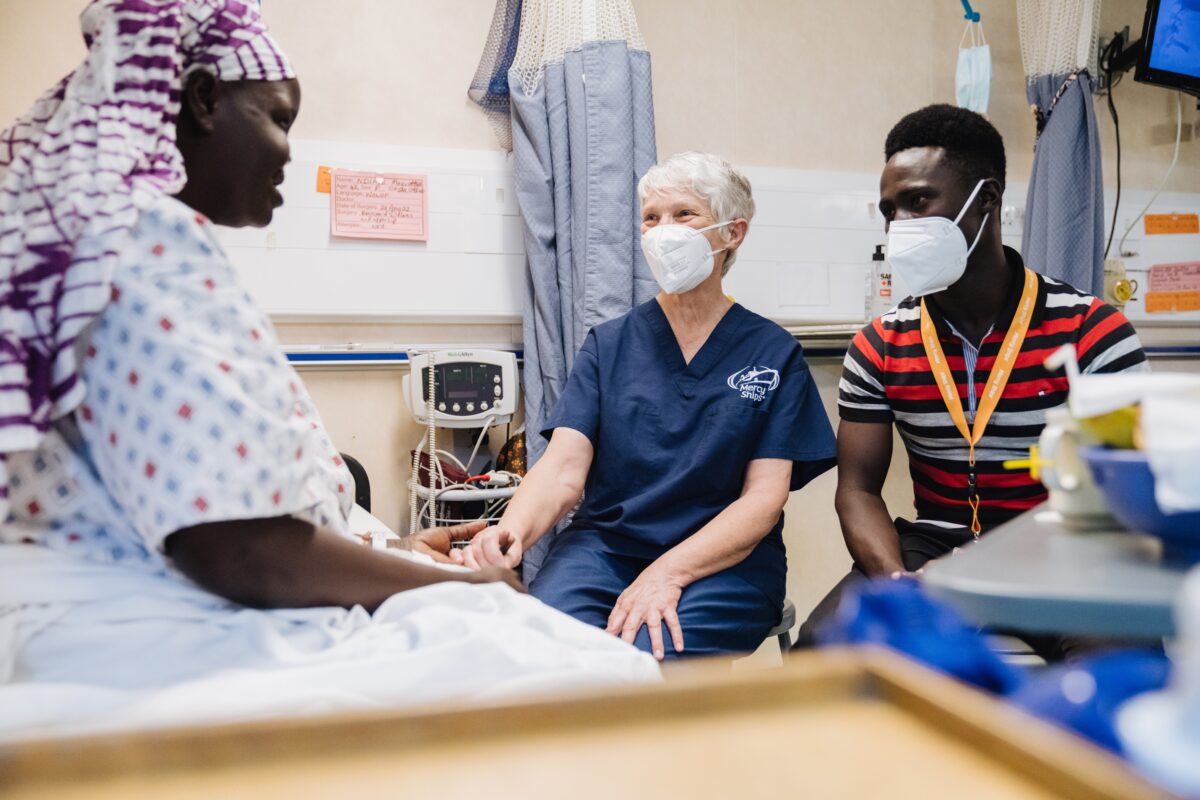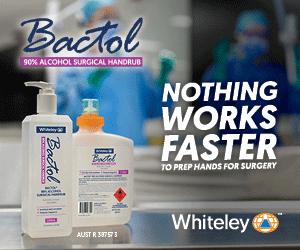Maggie, aged 35, had lived her whole life with a severe facial disfiguration, caused by a flesh-eating disease she contracted as a baby.
The Senegal woman has now undergone life-changing facial reconstruction surgery — rebuilding her nose and one side of her face — aboard a Mercy Ships floating hospital.
Maggie is one of the patients cared for by Auckland volunteer nurse Julie Murphy in her latest tour of duty for Mercy Ships, in Senegal, West Africa.
Murphy says she has been inspired by the resilience of her patients, who suffer from extreme conditions not often seen in New Zealand hospitals. “Maggie is an amazing lady and had obviously suffered a lot emotionally due to her appearance. Despite this, she is always smiling and always looking out for the other patients in the ward.”
When Murphy embarked on her first tour of duty with the hospital ship charity in 2011, her knowledge of African geography was sketchy at best.
Eleven years on, she recently completed her fifth volunteer service on board the Africa Mercy in Senegal, having previously served in Sierra Leone, Guinea, Madagascar and Cameroon.
What is Mercy Ships?
Mercy Ships is an international faith-based organisation that operates hospital ships to deliver free, world-class health-care services, medical capacity building, and health system strengthening to those with little access to safe surgical care.
Since 1978, Mercy Ships has worked in more than 55 countries, with the last three decades focused entirely on partnering with African nations.
Each year, volunteer professionals from more than 60 countries serve on board the world’s two largest non-governmental hospital ships, Africa Mercy and Global Mercy. Professionals including nurses, surgeons, dentists, health trainers, cooks, and engineers dedicate their time and skills to the cause.
Since 1978, Mercy Ships has provided more than 105,500 essential surgical procedures, and health-care services directly benefitting more than 2.84 million people living in poverty. More than 49,000 local health workers have been upskilled and trained in Mercy Ships medical-capacity building programmes.
For more information, visit the Mercy Ships website and follow us @MercyShipsNZ on social media.
New Zealand nurses are well respected onboard Mercy Ships because they are broadly trained and flexible, they are comfortable in multicultural environments, and are able to roll with stressful work conditions where every case is extreme.
For Murphy, volunteering has always been a goal. “Ever since I started nursing, I’ve wanted to volunteer with a non-governmental organisation [NGO] working in a medical field to help people living in low-income countries, who have very limited access to health care.
“Mercy Ships reaches to the poorest communities, into isolated regions where there is no basic health care.”
With nine out of 10 people in Africa unable to access safe surgery when they need it, Murphy says the patients who present at the hospital ships are usually complex cases.
“I wanted to offer my nursing experience and skills to help people directly. I have seen first-hand how Mercy Ships changes a patient’s life. Life-transforming — and in some cases lifesaving — surgery restores a person’s place in their family.
“Many have been outcast from their family and community due to cultural beliefs, such as the tumour or sickness is a sign that the person is evil or cursed. Post-operative patients are then able to return to living and contributing to their community.”
For many people in low-income countries, even basic health care is usually out of reach — either financially impossible or simply unavailable. Consequently, many live with treatable conditions because they cannot get the medications, treatments or surgeries they need.
Many have been outcast from their family and community due to cultural beliefs, such as the tumour or sickness is a sign that the person is evil or cursed.
For the last two decades, global health authorities have focused on individual diseases, while surgical care in low-income countries has not received the same attention. According to The Lancet, lack of surgical care results in an estimated 32 per cent of all global deaths; 16.9 million people a year lose their lives from conditions requiring surgical care.1
A typical year will see the Mercy Ships vessels docked at an African port city for 10 months of field service, providing direct patient care and building the capacity of local health services by training local staff in surgical care. (In the two months of down time, the ships sail for the nearby Canary Islands for maintenance and resupplying.)
Emphasis on paediatric care
Although surgical services are available for people of all ages, the emphasis is on paediatric care, particularly in orthopaedics and burn treatment. Surgical specialties offered on board Mercy Ships include ophthalmic work, maxillo-facial surgery (particularly cleft lip/palate reconstruction), removal of massive benign tumours, burns and plastic surgery reconstruction, paediatric orthopaedic surgery, obstetric fistula repair, and general surgery for hernias and goitres.
The surgical specialties and full patient rehabilitation services are scheduled consecutively during each 10-month field service.
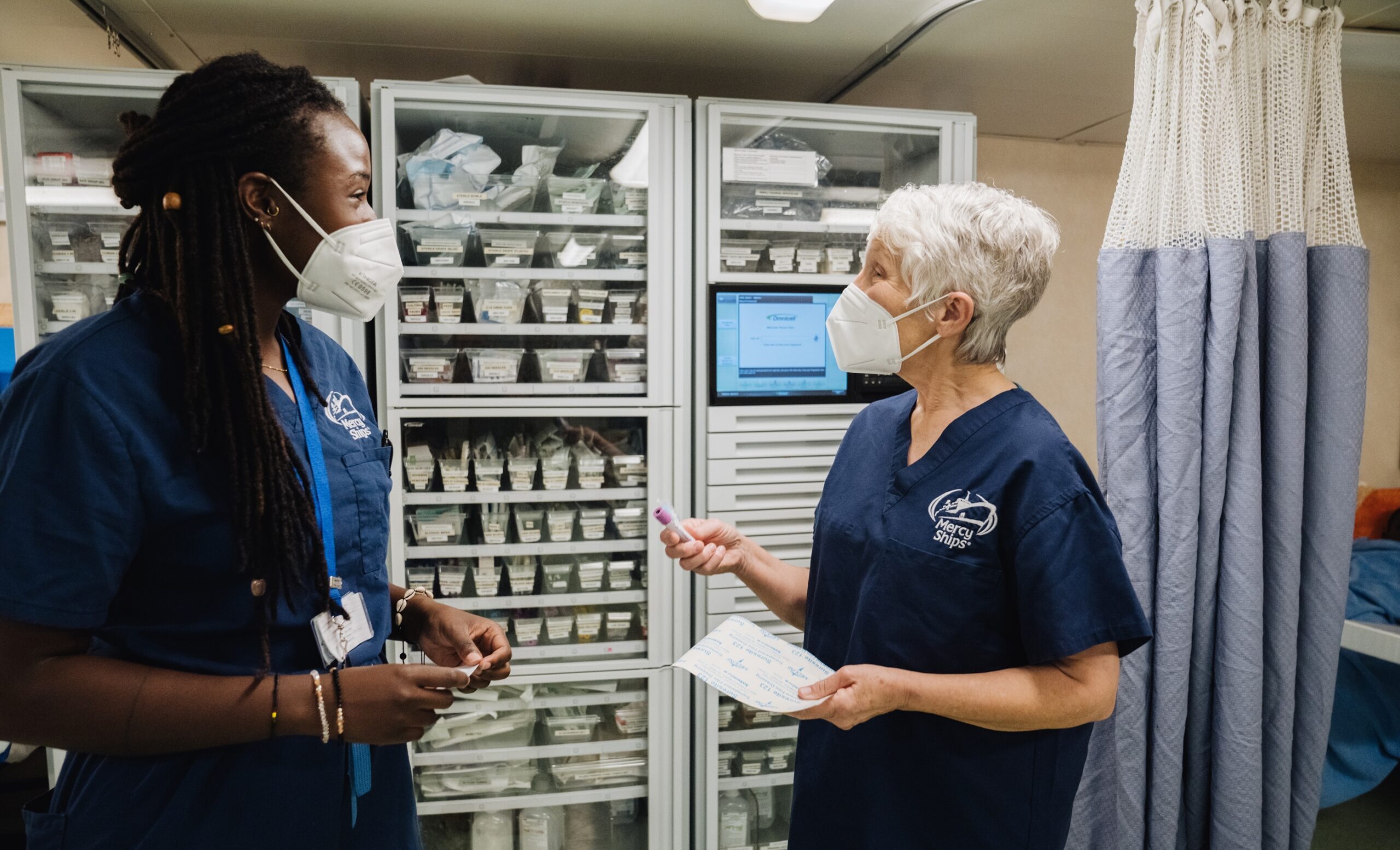
“I have learned so much from the people in each of the nations I’ve served in, and from the many health-care professionals on board,” Murphy says.
“I’ve learned different treatments, seen unusual surgeries, and gained new ideas of nursing care and treatments from this international medical team, and have learned different approaches to pre-op and post-op care, management of pain and wound care.”
Building local capacity
As well as providing direct patient care, Mercy Ships staff also focus on building the capacity of local health staff and helping develop the country’s health service. Local health-care professionals attend courses and workshops to upskill and learn new techniques. Murphy worked alongside several local health-care professionals being mentored on board.
Mercy Ships also helps develop local health infrastructure, building health clinics and supplying equipment, and works with the local health ministry to develop policies, gather data and improve health service coverage.
With patients of all ages admitted from urban areas and rural or isolated villages, translators play a key role, to ensure patient consent and that they understand every stage of treatment and rehabilitation.
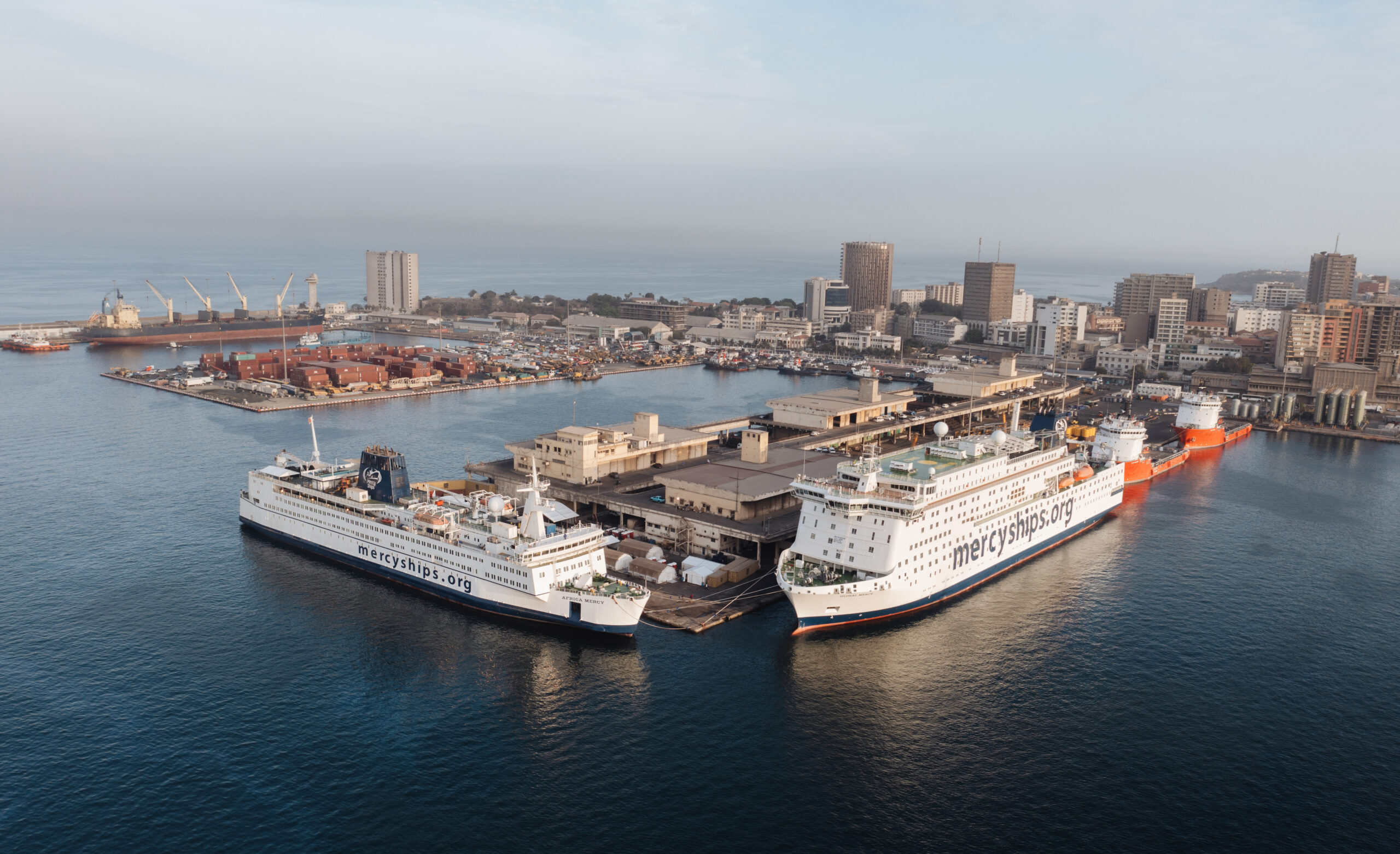
Last year, the new Mercy Ship Global Mercy joined the Africa Mercy, greatly increasing the NGO’s capacity to deliver health-care services.
The hospital, on the new 36,000 gross-tonne Global Mercy, has six operating theatres, six wards with 199 patient beds, and an intensive care unit. All the required allied health-care services are provided by the volunteer crew for the patient journey: radiology, medical laboratory, pharmacy, physiotherapy, hand and speech therapy, and nutrition.
As there is no local capacity for post-operative follow-up, patients must be able to function independently before discharge.
Particularly for paediatric patients undergoing major orthopaedic surgery and patients undergoing burns contracture releases and plastic reconstructive surgery, physiotherapy is essential. The most extreme cases require four or five months of rehabilitation.
As there is no local capacity for post-operative follow-up, patients must be able to function independently before discharge.
Outpatients who are from outside the port city are housed at the Mercy Ships Hospital Out-Patient Extension (HOPE) Centre in the city, until their treatment is finished, ensuring they can access their appointments and are well nourished to aid healing.
Lack of safe surgery
According to the Lancet Commission on Global Surgery, more people die each year from a lack of safe surgery than from HIV/AIDS, malaria and tuberculosis combined.2
In the region of sub-Saharan Africa where Mercy Ships serves, the lack of proper medical attention affects more than someone’s health; a severe health condition also brings disconnection.
People with conditions like large tumours, burns contractures and obstetric fistula are frequently ostracised from their families and communities. The patients coming to Mercy Ships have experienced fear, shame, and isolation because of their appearance or limitations.
Volunteer nurses on board frequently comment that nursing in the hospital ships’ wards is like “nursing as it used to be,” in terms of the opportunity to connect with patients on a meaningful level. “TLC” is an accepted and fulfilling part of the Mercy Ships’ nursing roles.
“Even if I can just be a small part of the puzzle, even if I can just help one person — restore hope, then this is what I came for,” Murphy says.
Africa Mercy and the newly deployed Global Mercy are crewed by health-care, maritime and operational professionals who donate their time and skills.
Find out more about the range of volunteer nursing opportunities on board at Mercy Ships.
Murphy describes care and interactions with two of her patients:
Maggie: a severe facial deformity repaired
Admitted to Mercy Ships at the age of 35, Maggie had lived her whole life with a severely disfiguring facial deformity. She was just a baby when a wound on her face became infected with the gangrene cancrum oris.
Maggie was susceptible to this infection due to malnutrition, poor sanitation and unhealthy living conditions. She survived the flesh-eating disease, but it left her without the left side of her face and part of the left side of her nose. When this eventually healed, a facial cutaneous nasal fistula remained.
She is an amazing lady and had obviously suffered a lot emotionally due to her appearance.
Her cheek was reconstructed by two volunteer plastic surgeons, with work initially done on her nose. Two months later, her nose and lip reconstruction were completed.
“I looked after Maggie post operatively,” Murphy says. “There were no complications during her recovery. She is an amazing lady and had obviously suffered a lot emotionally due to her appearance. Despite this, she is always smiling and always looking out for the other patients in the ward.
“An example of Maggie’s kindness is when she returned from theatre at around 7pm. At 9.30pm, a four-year-old girl was crying on the other side of the ward. I saw Maggie get up, and thought she was going to the bathroom.
“I went to accompany her, as it was only a couple of hours since her operation. But she walked to the other side of the ward to speak to the mother of the little girl. She stroked the little girl’s head until she stopped crying.
“I accompanied Maggie back to her bed, and via the ward translator, thanked her for her kindness and caring for the little girl. Maggie told me that this is what she does for her own children, when they are unhappy.
“Maggie called me over to say, ‘Thank you and all of Mercy Ships for my surgery,’ every time that I entered the ward afterwards.”
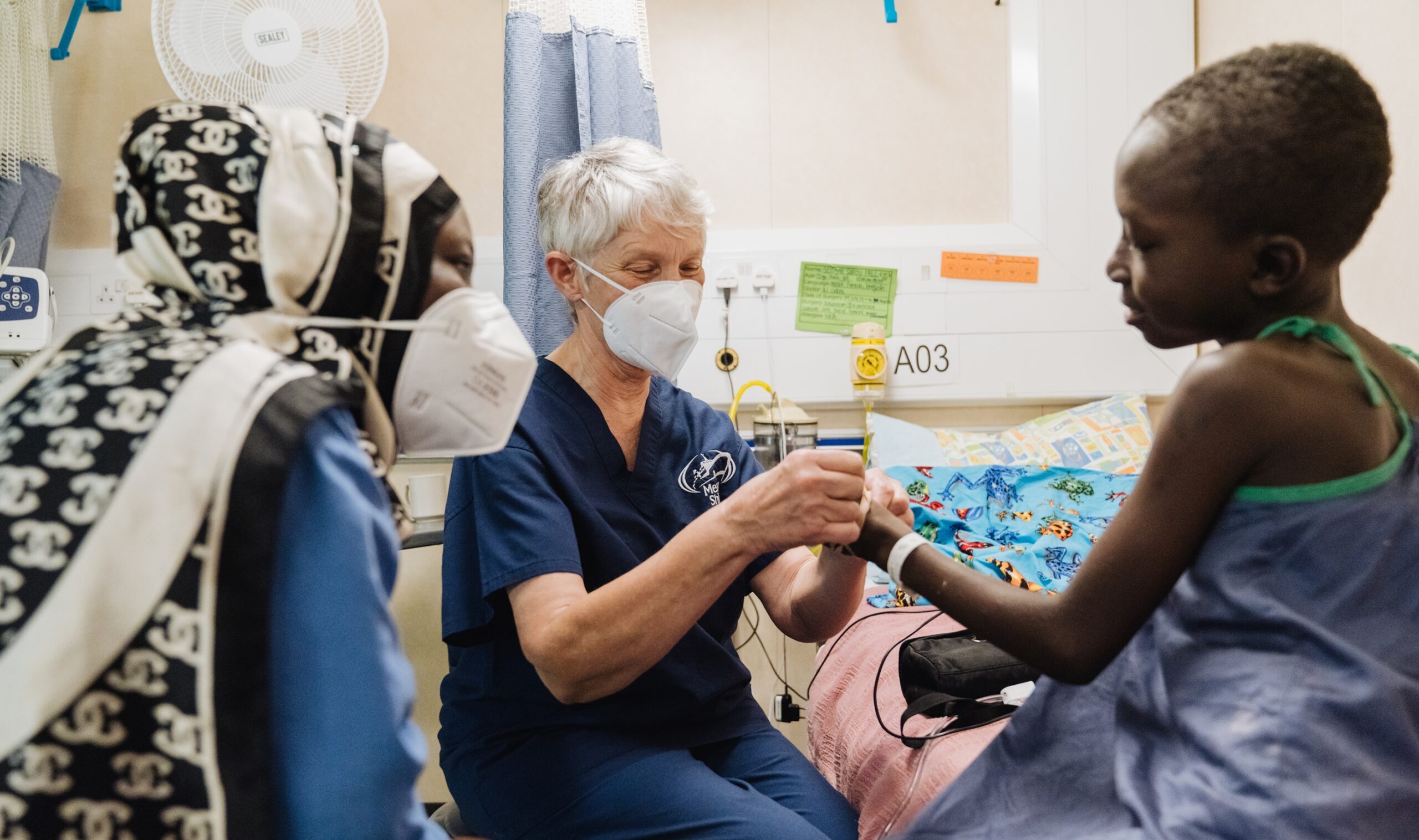
‘Sal was free from pain and fear . . . his childhood was restored’
Sal was born with a ganglio-neuroma, a tumour which can occur during foetal development, on his back and right side.
He was 12 years old when he arrived at the Africa Mercy with his sister; each child has a caregiver stay on board with them to ensure support and consent at every stage of treatment.
By the time he came for surgery, the neuroma had grown extensively, covering nearly 50 percent of his back. The operation to remove it took several hours to complete. Sal recovered well and was discharged to the HOPE Centre 12 days post-surgery.
Sal was readmitted to the ship’s ward 14 days later – the wound was discharging heavily, and the edge of the skin flap had become necrotic. He returned to surgery, for debridement of the wound and application of vac (vacuum-assisted) dressing.
“I cared for Sal when he arrived back from the HOPE Centre. There was quite a lot of oozing from the wound,” Murphy says. “Sal was very quiet when he and his older sister came to the ward. He was very worried about what was going to happen.
Sal was sometimes a little reluctant to have his blood pressure, pulse and other vital signs taken, so I asked him to use the equipment to take the recordings himself.
“I also looked after Sal the next afternoon, post-surgery I noticed that he loved playing games on his sister’s iPad and phone. Sal was sometimes a little reluctant to have his blood pressure, pulse and other vital signs taken, so I asked him to use the equipment to take the recordings himself. He loved doing this, so having vital signs measured was never any problem from that point.”
“Sal had a special vacuum pump [a vac dressing] attached to the wound dressing to drain any exudate from the wound site. This hastens the healing process. Again, I had Sal check the pump’s suction was set correctly at 125mmHg, and that the battery wasn’t getting low. Sal was in charge!”
Not only was the wound healing, but Sal was no longer withdrawn. He was often found running up and down the hospital corridor, and going into all the wards, “checking what the other patients and nurses are doing”. Sal was free from pain and fear. His childhood was restored.
VIDEO: Life-transforming care on board the floating hospital
Sharon Walls is the communications and volunteers manager at Mercy Ships New Zealand.
References
- Meara, J. G., Leather, A. J., Hagander, L., Alkire B. C., Alonso, N., Ameh, E. A., Bickler, E. A., Conteh, L., Dare, A. J., Davies, J., Merisier, E. D., El-Halabi, S., Farmer, P. E., Gawande, A., Gillies, R., Greenberg, S. L., Grimes, C. E., Gruen, R. L., Ismail, E. A., Kamara, T. B., Lavy, C., Lundeg, G., Mkandawire, N. C., Raykar, N. P., Riesel, J. N., Rodas, E., Rose, J., Roy, N., Shrime, M. G., Sullivan, R., Verguet, S., Watters, D., Weiser, T. G., Wilson, I. H., Yamey, G., & Yip, W. (2015). Global Surgery 2030: evidence and solutions for achieving health, welfare and economic development. The Lancet Commissions, 386(9993), 569-624.
- The Lancet. (2015). The Lancet Commission on Global Surgery.


